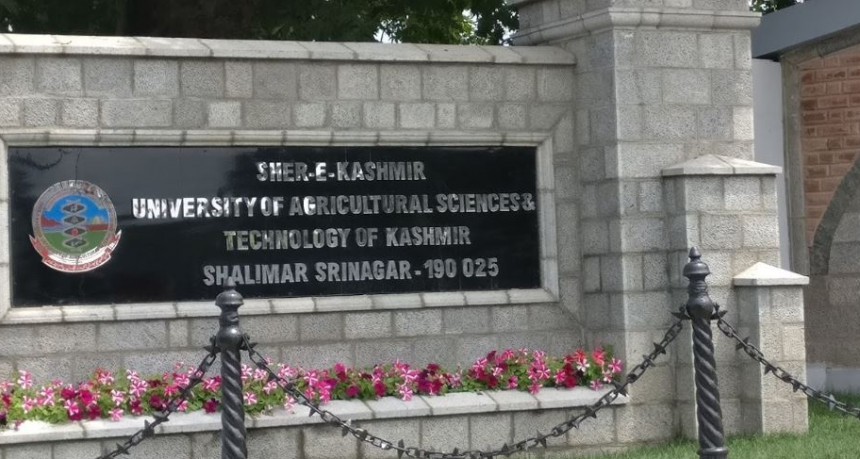Redefining Higher Education: SKUAST-K at the Forefront
Sher-e-Kashmir University of Agricultural Sciences and Technology of Kashmir, listed among the top ten agricultural universities in the country, is scripting a new chapter in higher education in Jammu and Kashmir. The university is pushing boundaries by offering market-driven, interdisciplinary courses tailored to meet the evolving demands of the 21st-century job market.
With a vision that blends critical thinking, creativity, innovation, global academic engagement, and entrepreneurial spirit, SKUAST-K has created a robust ecosystem centred on Education, Research, Extension, and Entrepreneurship.
In 2024, the university introduced cutting-edge programs in fields such as Microbiology; Artificial Intelligence, Biotechnology, and Data Economics—initiatives that mark a significant departure from its traditional agricultural focus.
IBPR: Crafting a Curriculum for the Modern Economy
Under the leadership of Vice Chancellor Prof Nazir Ahmad Ganai, SKUAST-K has taken a bold step forward by opening its academic doors to students from diverse backgrounds. At the heart of this transformation is the Institute of Business and Policy Research (IBPR), formerly the School of Agricultural Economics and Horti-Business Management, located at the Shalimar campus.
IBPR has rapidly evolved into a hub for economics and business education, designed to prepare students for leadership roles in policy, business, and innovation. Its programs are aligned with industry needs, and cater to students from both agricultural and non-agricultural backgrounds.
Courses That Open Careers
IBPR’s academic courses are future-ready and inclusive:
- BSc (Hons) Economics and Data Science – A flagship program launched in 2024, open to students with a background in Mathematics, Statistics, or Economics at the 10+2 level.
- MSc and PhD in Agricultural Economics – Advanced research programs focusing on agri-policy, rural development, and economic modelling.
- MBA Programs – Specialisations in Finance, Marketing, Human Resource Management, and Agro-Tourism, open to graduates from all disciplines.
- MBA and PhD in Agri-Business Management – Tailored for students with an agriculture background, addressing agripreneurship and value-chain innovation.
A 360-Degree Learning Ecosystem
IBPR’s unique strength lies in its comprehensive approach to student development. It offers what the management discipline calls a 360-degree learning environment, engaging students through a wide range of academic, professional, and experiential learning platforms.
These include:
- Training programs under MSME schemes to promote start-up culture.
- Workshops on advanced research methodologies.
- National institutional exchange programs.
- Policy debates, seminars, and academic events.
- Internship opportunities in-house and with top-tier business houses.
- Placement support and career guidance.
- Hands-on training in project report and business plan preparation.
- Active participation in national-level conferences such as JK AgriMed 2024 and AERA 2025.
- Exposure to real-world policy and research challenges under HADP (Holistic Agriculture Development Programme).
IBPR’s core faculty boasts national and international recognition, while its adjunct faculty—drawn from administration, industry, and leading academic institutions—brings valuable real-world perspectives to the classroom.
Student Voices: Learning That Inspires
The most powerful testament to IBPR’s impact comes from its students:
- “The course is challenging but incredibly rewarding. If any of these opportunities speak to you, then this is the place to be.”— Fatima Noor
- “Youth should definitely consider Economics and Data Science at SKUAST-K. The learning environment is student-focused, and the mentorship here is truly personal and effective.” — Moaizim Majeed
- “As an MBA student, I’m proud to be part of a program that, despite its recent launch, is already performing better than many long-established institutions.”— Atufa Bint Bashir
- “An MBA from SKUAST-K is like acquiring a powerful toolkit for your career. It sharpens your business acumen and helps you grow as a leader and decision-maker.”
— Rounak Qayoom Khajwal
Conclusion: Bridging Disciplines, Building Futures
In a region striving for economic resilience and youth empowerment, SKUAST-K – through IBPR – is setting an inspiring example. By integrating disciplines and reaching out to students beyond traditional agriculture, it is creating a new breed of professionals ready to lead in policy, business, and innovation.
The message is clear: whether you are a student of economics, science, business, or humanities – there is a place for you at SKUAST-K, and that place might just lead to your next big dream.
(The author is faculty at SKUAST-K’s Institute of Business and Policy Research (IBPR). He can be reached at: [email protected])








